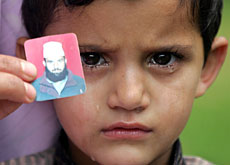War archives join Unesco heritage list

Red Cross archives in Geneva recording the fate of two million prisoners captured during the First World War have joined Unesco's "Memory of the World" register.
The recognition by the UN’s cultural agency, which aims to prevent “collective amnesia” by preserving mankind’s documentary heritage, comes almost nine decades after the November 11 armistice.
“These archives show Switzerland’s openness and contribution to peacekeeping in the world,” said Swiss Interior Minister Pascal Couchepin at a formal ceremony in Geneva on Thursday.
The information covers prisoners from 14 countries – dominated by French and German soldiers, but also from the Balkans and the colonies – which detaining authorities sent to the Swiss-based International Committee of the Red Cross (ICRC).
Around nine million men lost their lives during the “war to end all wars”, many in horrific trench battles, the ICRC says. Its archives cover two million of the estimated seven million servicemen taken prisoner, mainly those on the western front.
Former French President Charles De Gaulle and singer Maurice Chevalier were among the soldiers whose names, birthplace and places of capture the German forces meticulously recorded.
“The archives will be preserved for posterity. They are a monument to suffering, even if it seems cold on paper,” said Martin Morger, head of ICRC’s conservation services.
The ICRC set up the International Prisoners-of-War Agency in August 1914 to restore contact between people separated by the conflict – prisoners of war and interned civilians whose families were desperate for news. Its delegates also visited many prisoner of war camps to check on conditions.
Unesco, which agreed in June to include the ICRC archives in its “Memory of the World” register, said they provided “testimony on the extent of human suffering during the First World War, but also of pioneering action to protect civilians”.
“The ICRC archives now stand alongside important documents such as the text of the 1789 Declaration of the Rights of Man and of the Citizen, the Gutenberg Bible, the manuscript of Beethoven’s Ninth Symphony or the oldest inscription of the Koran,” said the Red Cross and Red Crescent museum’s director, Roger Mayou.
Meticulously recorded
“It was the first time in history that this kind of tracing was done. At the time there were up to 1,000 requests from families per day which kept 500 volunteers busy,” Morger said.
The volunteers maintained the lists of prisoners provided by German as well as Allied authorities in Europe, Africa and Asia. These were bound into 2,413 black volumes covering the period between 1914 and 1923.
Individual cards were typed up for each name and updated if the prisoner was moved, received medical care or died. Relatives and friends’ efforts to trace the missing were also noted.
A blue card bearing the name Maurice Chevalier records that the Parisian, part of infantry regiment 31, was captured and sent to a prison camp in Alten Grabow in Germany.
A card for De Gaulle said the 25-year-old captain in the 33rd infantry fell into German hands at Verdun in 1916.
“The International Prisoners-of-War Agency also asked comrades about missing soldiers, which unfortunately often led to learning the circumstances of their death,” Morger said.
The ICRC archives, which stretch 400 linear metres, were stored for years in a Geneva school basement, where some were damaged by humidity. Part of the impressive collection is on display at the Red Cross and Red Crescent museum in Geneva.
The agency has embarked on an ambitious project to restore and digitalise the archives by 2014 – the 100th anniversary of the war’s start – and make them available on the internet.
“We still get about 200 requests a year for information, mostly from families doing genealogical research. They are the children and now the grandchildren of the former combatants,” Morger said. “We also get requests from historians worldwide.”
swissinfo.ch and agencies

More
International Committee of the Red Cross
In October 1914, after the first prisoners of war were captured, the ICRC opened its International Agency in Geneva. Its role was to restore contact between people separated by war – prisoners of war, civilian internees and civilians in occupied territories.
The agency began with just 10 employees, but by 1918 it had hundreds, and the agency was dealing with millions of inquiries. During the conflict it listed almost five million prisoners of war, visited many of them and enabled families to send relief parcels.
The archives of the International Prisoners of War Agency, 1914-1923 have been inscribed on Unesco’s “Memory of the World”. As a pioneering action to protect civilians, the documents widen perspective for the study of international relations from the angle of humanitarian aid, Unesco stated.
Other documentary heritage among the 158 inscriptions on the Unesco register include: the original handwritten version of the 1789 Declaration of the Rights of Man and of the Citizen, Argentinian human rights documentary heritage (1976 – 1983), the Phoenician alphabet from Lebanon, convict records of Australia and the Hereford Mappa Mundi mediaeval world map.
The First World War was an international conflict between the Central Powers — Germany, Austria-Hungary, and Turkey—and the Allied Powers — mainly France, Britain, Russia, Italy, Japan, and (from 1917) the United States which took place primarily in Europe from 1914 to 1918.
According to the Red Cross, a total of 65 million men from 44 countries fought in the war and nine million were killed in action.
Seven million military personnel were taken prisoner. Civilians in enemy territory were interned en masse, and millions of others were subjected to military occupation or fled the area of fighting and the occupied territories.

In compliance with the JTI standards
More: SWI swissinfo.ch certified by the Journalism Trust Initiative











You can find an overview of ongoing debates with our journalists here . Please join us!
If you want to start a conversation about a topic raised in this article or want to report factual errors, email us at english@swissinfo.ch.